Peter MALONE
Saturday, 18 September 2021 19:34
Morgan: A Suitable Case For Treatment
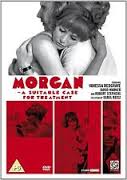
MORGAN - A SUITABLE CASE FOR TREATMENT
UK, 1966, 97 minutes, Black and white.
David Warner, Vanessa Redgrave, Robert Stephens, Irene Handl, Bernard Bresslaw.
Directed by Karel Reisz.
Morgan – A Suitable Case for Treatment was a star vehicle for David Warner, a stage actor with the Royal Shakespeare Company who had appeared in a number of films including Tom Jones as the villain, Blifil. After making this film he made a few more in England and then went for a successful career for many decades in the United States in film and television. He returned to England in the 1990s. It was also a star vehicle for Vanessa Redgrave who was emerging from stage performances with a cameo in this year in A Man For All Seasons. Karel Reisz was soon to direct her in Isadora and she also appeared in Blow Up.
The film reflects the zany aspects of the 1960s and its social changes. David Warner portrays a young man who is eccentric, self-absorbed, who does his own thing and finds his finally in an institution and divorced from his wife. She is played by Vanessa Redgrave.
The film was well liked in its time. Vanessa Redgrave won an Oscar nomination for it as well as winning the best actress award in Cannes. The film was screened in competition there. The screenplay by well-appreciated playwright David Mercer won a BAFTA award for best screenplay.
Czech-born Karel Reisz made short films in the 1950s with such directors as Tony Richardson and Lindsay Anderson. His breakthrough film was Saturday Night and Sunday Morning. He also later directed The French Lieutenant’s Woman.
1. The impact of the title, especially A Suitable Case for Treatment? The impact if the title and its relevance to the film? The tone of madness and cure?
2. How important was the black and white photography, the use of white, the music, the style such as frozen frames etc? The visualising of fantasies in reality?
3. How typical of British 1950s and 1960s drama was this? The standards of living and of humanity? The picture of society, sensible and mad? Prisoner of fantasy, creator of fantasy? King Kong and Tarzan fantasies of an English madman? How effective an insight into British society was this drama comedy?
4. Could Morgan be seen as an Everyman figure? Disintegrating? fantasy, mad, unable to cope with the pressures of life, the victim of society and history? Or is the figure of Morgan much more slight?
5. Was Morgan explored as a character? Or was he a comic caricature? His background, his mother, Communism, his relationship with Walter and his talks with his mother? How had he married Leonie? What had gone wrong? His capacity for responsibility? Failure in marriage? The victim of his fantasies, the creator of them? Enjoying his fantasies? Escaping from reality? Self created hero? The malice and goodness of his fantasies? The fulness of his madness? The reality of his love for Leonie? Where had he arrived at the end of the film? Had he any future?
6. The comment on British society especially via Marxism? the Cockney Marxists? The police and the ridicule of the police? The contrast of rich and poor? The pretensions of society etc? The hypocrisy of law? The destructive nature of society at the end?
7. How did Leonie contrast with Morgan? Her sense and her sensibility? Unable to cope with Morgan? Her decision to marry Napier as sensible? Her being kidnapped and failing to respond to Morgan's idyllic holiday? The influence of her parents and the hold over her? The hold of Napier over her? Whose child was she bearing at the end?
8. How did the film show the contrast between Napier and Morgan? Who was sensible and who was mad? Their comparative roles in society? Their relationship with Leonie?
9. Morgan's mother and her character? Her thinking of him as a traitor? Her advice? The influence of Wally in the film?
10. How amusing were Morgan's antics in themselves? Their total effect for the film? The hammer and sickle on the rug? His camping outside her house, the wiring of the house for Napier's and Leonie's kitchen, the bomb for the mother-in-law Did Morgan deserve prison for these?
11. Was the final firing squad in the rubbish dump adequately symbolic? The defeat of Morgan?
12. How was Morgan a failure? How pessimistic was the film? The misfit rebel who does not succeed? The madman in modern society?
13. How much truth was told via madness and comedy?
Published in Movie Reviews
Published in
Movie Reviews
Tagged under
Saturday, 18 September 2021 19:34
Miss Sadie Thompson

MISS SADIE THOMPSON
US, 1953, 91 minutes, Colour.
Rita Hayworth, Jose Ferrer, Aldo Ray.
Directed by Curtis Bernhardt.
The second film version of Somerset Maugham's story. Maugham visited Pago Pago in 1916 and wrote a short story about Miss Sadie Thompson in 1920. It was dramatised for the theatre, especially for actress Jeanne Eagles in the mid-twenties (echoes of this are seen in the biography of Jeanne Eagles starring Kim Novak.) It was filmed with Gloria Swanson as a silent film.
It was then directed by Lewis Milestone, who had achieved fame as the director of All Quiet on the Western Front (1930) with the emerging actress Joan Crawford in the lead. An early as 1932 Joan Crawford shows all the characteristics of the strong kind of women that she was to play over many decades. Walter Huston in very good as the tormented missionary. There was an up-dating of the story to the World War II period and songs were added to make it a Rita Hayworth vehicle in the mid-fifties. The title reverted to the main character, Miss Sadie Thompson. Jose Ferrer in very good as the tormented missionary this time. Aldo Ray has a good role as an ingenuous sailor. The story was set at a time when the missions were spreading in the South Pacific and there were mixed reactions of people, Maugham taking a view critical of the missionaries imposing their ideas and behaviour on the people of the South Seas and making them change. He shows this by the valid dramatic presentation of a missionary betraying his ideals and becoming a victim of conscience even as he is trying to convert the saloon and dance-hall girl from Honolulu. The story has a valuable message for any time - the clash between pride and sensuality and the danger of hypocrisy. The earlier version is the more straight forward one, the second version has the essence of Maugham's story but in geared towards presenting Rita Hayworth.
Seas and making them change. He shows this by the valid dramatic presentation of a missionary betraying his ideals
and becoming a victim of conscience even as he is trying to convert the saloon and dance-hall girl from Honolulu. The story has a valuable message for any time - the clash between pride and sensuality and the danger of hypocrisy. The earlier version is the more straight forward one, the second version has the essence of Maugham's story but in geared towards presenting Rita Hayworth.
1. This film was a big hit of the 1950s. Does it seem now outdated? Or still modern enough? Why?
2. The original name of this piece was 'Rain'. The film used the symbolism of rain. Does this add to the significance of the film?
3. Did the film portray the war situation well? What atmosphere did the war situation give the film?
4. The film was presented as a kind of morality play, with good on the one hand and bad on the other with Sadie in the middle. The irony was the good (Mr Davidson) appeared good but was bad, Sadie appeared bad but was good. Does this morality play add significance to the impact of the film?
5. What kind of person was Sadie Thompson? How average a kind of a person? How bad? (Rita Hayworth's performance in the early fifties was considered hot and sexy?) Did she need cleansing?
6. The atmosphere of Puritanism on the island: drinking, dancing on Sundays? How did the atmosphere of Puritanism add to the morality play impact and drama?
7. What kind of person was Mr Davidson? Was he presented in any way as admirable? His religious zeal, the tradition of his family preaching on the island? Why was he so obsessed with religion? The irony of his appearing good but being bad?
8. O'Hara - what kind of person? Typical GI? Typical American? How single and naive? Did he really love Sadie? Why did he turn on her? What future could he offer her?
9. Why was Davidson so concerned about Sadie's conversion? Did the film make her conversion credible? What were the motives of her change of heart?
10. How bitter was the disillusionment of Sadie by Davidson? Could you understand how she became so bitter?
11. Were you shocked at Davidson's suicide? Why did he kill himself? Did the other characters explain this satisfactorily?
12. How did Sadie learn to cope with all this? How had this changed her life? What future did she have?
13. Was the happy ending satisfactory?
14. The film was rather melodramatic. What impression did it make? Just a musical entertainment with some drama? Or did it have something really worthwhile to offer on good and evil?
Published in Movie Reviews
Published in
Movie Reviews
Tagged under
Saturday, 18 September 2021 19:34
Mr Buddwing
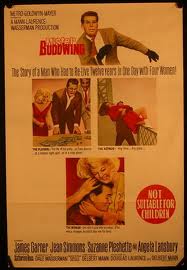
MR BUDDWING
US, 1966, 100 minutes, Black and white.
James Garner, Jean Simmons, Suzanne Pleshette, Katharine Ross, Angela Lansbury, Jack Guilford, Raymond St Jacques.
Directed by Delbert Mann.
Mister Buddwing is an amnesia story. James Garner appears as a man wandering the streets of New York City with only a few clues like notes in his pocket, a phone number, a ring to indicate how he might find out who he really is. He encounters three women who remind him of the woman who ultimately is revealed as his wife.
This is a pleasing star vehicle for James Garner who was emerging during the 1960s as a very successful romantic lead. He was to consolidate his popularity with his television series Maverick, The Rockford Files. The film has a very strong cast of leading women to support him.
The film is similar to another amnesia story from the year before, Mirage, starring Gregory Peck.
1. How enjoyable a thriller was this? Why does a film about amnesia create interest? Did you find Mr Buddwing's search for identity engrossing?
2. How did the film make us identify with Mr Buddwing? The important sequence of his waking up and finding an alien city? Of seeing through his eyes? Of not knowing himself? (And the fact that the film ended with the same kind of sequence?)
3. How closely was the audience supposed to identify with Mr Buddwing? We knew as much as he did. We felt with him. The loss of identity and the need for an identity? The importance of his choosing a name? Of wanting to know something about himself? (The film was not realistic. He did not go to a doctor etc. Did this matter for this film?) The film seemed a journey for identity. How well was this done? Did this give the film some kind of allegorical or parabolical significance? Why?
4. What were your impressions of Gloria? As a person? Her needs? Why was she so compassionate towards Mr Buddwing? Her giving him the money? Did this impression later change when he rang her at the end of the day? What good did she do for him?
5. What good did Mr Schwarz do for Mr Buddwing? His friendliness at talking at breakfast? Their talking about being Jewish? How did this illustrate human kindness and goodness? How important was it for the film?
6. Why did Buddwing think that Janet was Grace? Why did he remember and start talking in the presence of this girl? What did you learn about him in what he remembered, thinking that Janet was Grace? Of him as a man? In love? Janet as an innocent young person supporting him? Their discoveries together? Their marriage and their love?
7. Why was she a different person from Janet but yet Grace? How important was what Buddwing remembered with Fiddle? How had Grace changed? Why had she changed? The unhappiness of the years together? Buddwing's losing of his ideals and changing? His callous attitude towards the pregnancy? The significance of Grace's attempted suicide? What had happened to Grace how had she changed?
8. The blonde, why did Buddwing see her as Grace? What had happened to Grace in the meantime? What had happened to their marriage? Their love for each other? Her attempting suicide?
9. How well did each of the women correspond to the image of Grace in Buddwing's story? How well was this done? From innocent and happy youth to middle age and desperate towards life? To a break-up and degeneracy? How did each of the women in herself illustrate this theme? The student? The would-be actress? The wild women and her gambling? How did all this illustrate the relationship between man and woman? Husband and wife?
10. What insight into his personality did this give Buddwing? He feared at one stage that he was a madman. What did his memory reveal to him about himself? How mad was he? The significance of his being confronted by the policeman? Especially by the man who thought he was god?
11. How significant was the gambling sequence? The importance of the blonde and her urgings him to risks? The fact that she was lucky? The continued frenzy of the gambling game? How important was it for Buddwing that he risk all and gamble: for his memory, for his personality? How shocking was the discovery that he made?
12. The significance of the name of Grace? The fact that she was offering him some kind of salvation? Was it obvious why he didn't want to remember? Was there a chance through the purgatory that he had suffered for his redemption? For his offering himself for Grace again? Was this the basic meaning of the film?
13. How important was it that it was a search film? A search in a city and in city types? City styles and life? Buddwing as the everyman searching in the city? Everyman meeting everywoman?
14. How successful was the technique of using three actresses to portray Grace? Why?
15. Was this a good film? Were its intentions equal to its execution?
Published in Movie Reviews
Published in
Movie Reviews
Tagged under
Saturday, 18 September 2021 19:34
Mister Cory
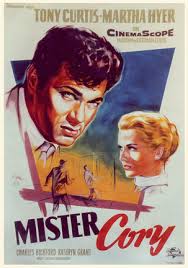
MISTER CORY
US, 1957, 92 minutes, Colour.
Tony Curtis, Martha Hyer, Kathryn Grant, Charles Bickford, Henry Daniell.
Directed by Blake Edwards.
One of the earliest films directed by writer Blake Edwards. It was to be the beginning of a long and successful career as writer and director. There were some dramas and comedies in the early sixties, for example Days Of Wine And Roses. The Great Race and other comedies predominated in the late sixties. Edwards wrote and directed The Pink Panther as well as all the sequels with Peter Sellers. He was still making comedies in the late seventies-early eighties with Ten and S.O.B.
Tony Curtis worked for Edwards in this film, The Perfect Furlough, Operation Petticoat and The Great Race. The film marks the beginning of Tony Curtis's career as a more serious actor, for example Sweet Smell Of Success, Spartacus, The Outsider. There are good performances from Charles Bickford and Kathryn Grant. Veteran actor Henry Daniell has a very good role towards the end of his career. The story is reminiscent of later stories, for example American Gigolo. The characters and the interactions are reminiscent of later television soap opera serials like Dallas. The film is well done in its way, crisply written and quite well acted. It still remains very enjoyable and interesting.
1. The entertainment value of this kind of American story? America as the land of opportunity? from poverty to riches? The possibilities of career and future in the United States? for good, for bad? Learning from experience? The conventional material of television soap operas? the treatment raising the level of the film?
2. Blake Edwards as writer and director? The early finesse of his films in a long career? The strengths of the performances, the quality or the dialogue, the witty one-liners? Colour, Cinemascope, the musical score?
3. The American world? class in society, quality, snobbery, inverted snobbery, the push to the top, people using one another, relationships, surface morality?
4. Tony Curtis's interpretation of Mr Cory? The quality of his acting? An American type, credible? his Chicago origins and his later return there and visit with Abby? How much had he changed through his experience? How much still the same? The American slum boy makes good? A traditional American type?
5. The portrait of Cory - going to his job at the country club, his aim, the discussion with Earnshaw and the later clashes, playing cards with the other boys, their hostility and his defiance, the golfing sequence, insinuating himself into society, the birthday party and Abby, listening to Alea's and Abby's conversation, going to the house, fixing the boat, the meeting with Jenny? The irony of his being caught by Abby and her reaction?
6. Cory as an exploiter, pragmatic? Jenny seeing through him yet supporting him? Playing cards with Jeremiah? The effect of his being caught out and the moving upwards?
7. Las Vegas and Reno, the new encounter with Jeremiah. the proposal, Jeremiah explaining his limitations, their work as partners, professional gamblers? How well drawn the character of Jeremiah ? as professional gambler, old man, ulcers and milk, working in partnership, the clash about Abby and Alex? Abby as heroine - the arrogant and elegant American blonde? Her relationship with Alex and not consenting to marry him? Her push, her snobbery? Infatuation with Cory and her indecision? Clashes, the drive from the station and her
reckless driving? Her discovery of the truth and reaction? Class attitudes? The contrast with her parents and their more genial approach? The engagement to Alex and the visit to the club? The orchids sent to Chicago? Her infatuation with Cory, the liaison and visiting him? The visit to the slum street? His proposal and her not being willing to marry? The clash, the violence with Alex's shooting? Her being the object of jealousy? Her finally marrying Alex? the prospect of their future?
8. Jenny and the contrast with Abby? A nice young girl, fresh, blunt? Her directness and its humour? Aiding Cory? Continued friendship on his return to Chicago? The ending? a future for them?
9. Alex and his long friendship with Abby, the proposal, his disappointment, the engagement, his gambling, recklessness, his father and the possibility of a raid on the club, the appeal to Cory and the rejection, his shooting him? A credible character?
10. The transition to Chicago? Cory's intuitions about the gambling house and its elegance, the irony of his hiring Earnshaw, the clientele that he attracted, the gang boss and the partnership, the potential for the raid at the end? Cory's decision to leave the house? for the sake of Abby, for a future?
11. The credibility of the melodramatics? the clash with Alex, the shooting and its repercussions? The clash with Jeremiah? The boss and his planning to cover up with the police?
12. Cory and his future? would he go straight? (as did so many of America's financial tycoons? the shady origins and the change to respectability?) The future with Jenny, with Earnshaw? and Earnshaw's help during the shooting, his relenting and the joke about bigamy?
13. Entertainment at the popular level and the presentation of typical American types, the pros and cons, a story of the fulfilment of American dreams?
Published in Movie Reviews
Published in
Movie Reviews
Tagged under
Saturday, 18 September 2021 19:34
Mister Quilp
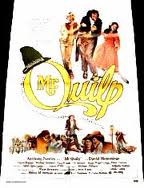
MISTER QUILP
UK, 1975, 118 minutes, Colour.
Anthony Newley, David Hemmings, Jill Bennett, Sarah- Jane Varley, Michael Hordern, David Warner, Philip Davis, Brian Glover, Ronald Lacey, Paul Rodgers, Mona Washbourne.
Directed by Michael Tuchner.
Mister Quilp is a version of Charles Dickens’ The Old Curiosity Shop, very popular in its time, but considered far too contrived, melodramatic and sentimental by later generations. This is the novel which features the character Little Nell and the pathos of her death.
This is a musical version of Dickens. In the 1960s, Lionel Bart had composed Oliver and it had been a great success. A number of musical versions of Dickens’ stories followed including Scrooge, based on A Christmas Carol, starring Albert Finney as well as Great Expectations with Michael York and James Mason.
The star of this film is Anthony Newley who also wrote the songs (a number of which were excised from the American version which then became The Old Curiosity Shop). Sarah-Jane? Varley is Little Nell and Michael Hordern is her grandfather who gambles away his money, is in debt to Mister Quilp and finds it difficult to pay. There are various Dickensian situations, Dickensian villains. This is moderately entertaining in itself, very much a musical of the 70s, and perhaps an opportunity to familiarise oneself with the overall plot of The Old Curiosity Shop.
Michael Tuchner began directing in England including such films as Villain and Fear is the Key but went to the United States and directed a great number of telemovies.
1. For what audience was this film made? The production values of the Reader's Digest company? The use of Dickens and his presentations on film? Family response to this kind of film?
2. The use of colour and Panavision? The recreation of the 1840s setting in London, in the country, houses, streets, the costumes etc? How authentic was the presentation? How much a visual presentation of Dickens' world?
3. The quality of the film as a musical? The songs integrated into the plot, for characters, for themes? The repetition of the song "Somewhere"? Anthony Newley's songs and their lyrics, quality? Newley himself performing his own songs?
4. What particular aspects of the atmosphere of Dickens were to the fore? The various themes of poverty, city life, family
relationships? Did the film pay tribute to the classic novel on which it was based?
5. The complexities of the plot? Interesting characters interesting situations, gradually developing episodes? How much dramatic momentum was there in the development of the plot?
6. Did the film concentrate on developing the characters or merely portraying them? The focus on Trent, Nell, on Mr Quilp himself? The character of Dick Swiveler and his episodic appearances? Henry Trent and his search for his brother? The emergence of Kit as the hero of the film at the end, credible?
7. Comment on the themes that the film developed: what development and exploration of the theme of the poor, oppression, racial injustice, the role of fate in life, the theme of death?
8. Was it appropriate that the film focused on Mr Quilp or should it have focused on the old curiosity shop and its inhabitants? What balance did this give to the film?
9. How interesting was the character of Mrs Quilp? How would his character be described? Did his songs add insight into his character? Anthony Newley's style especially in his particular way of acting? Quilp's attitude towards people, his oppressing them? His mother-in-law and his wife? Why was he so harsh towards the Trents? Trent and the use of his money? His hold over Samson Bars and his sister? His attitude towards Nell? Themes of greed, hounding people, his exasperation about his gold? The build up towards his search for Trent, the irony of his death and his being unable to help him? How horrible a character? Any redeeming features? What was Dickens trying to portray in presenting this character?
10. The contrast with Nell? initially lost, an attractive young heroine? Poverty, devotion to her grandfather, ingenuity in escaping? The importance of the songs in illustrating her character? Her devotion to her grandfather and yet her disappointment in his gambling and weakness? Involvement with the 'Punch and Judy’ people, the races, Mrs Jarley? The effect of the wanderings on Nell? Her support of her grandfather? Her own illness? The miners and their care of her? Her finally reaching St. Edmund's? The scene of her death?
11. How well delineated was the character of the grandfather? His role in the old curiosity shop? His way with money, the puzzle about his business, the revelation of his gambling? His escaping with Nell and dependence on her? Sharing the adventures? His gambling and the revelation of his weakness? His willingness to rob Mrs Jarley? The impact of Nell's death on him? What was Dickens trying to portray through this character?
12. The character of the Brasses? Their hardnesses, typical Dickensian characters? Samson Brass and his profession, his toadying to Quilp, his attitudes towards Nell? His subservience to Quilp in all his double dealing? His willingness to frame Kit? His fear and telling the truth? His sister and her harshness, supporting her brother and framing Kit? The final scene of her consoling Quilp's mother-in-law? Their involvement in the light-hearted aspects of the film, the songs about the law etc.?
13. The sympathetic character of Dick Swiveler? His niceness towards Nell, his being employed by Quilp, his relationship with the Brasses, his friendship with the Duchess and his help in revealing the truth? His songs? The fact that he appeared spasmodically in the film?
14. The portrayal of the London types for example, Tom and his work for Quilp, his lodgings? Quilp's mother-in-law and his wife? The people in the London streets etc.?
15. The contrast with the country types, for example the Punch and Judy men, their role in the carnival, their search for the reward? The people at the races? Mrs Jarley and her kindness towards Nell and her grandfather? Her wanting to be educated and of good class? How enjoyable a character?
16. The mysterious role of Henry Trent? The serious side of the film? The lack of explanation of his relationship to his brother? His tracking him down, his presence at Nell's death? Redeeming the situation?
17. Did all this prepare us for Kit's owning the old curiosity shop at the end and being successful? His memory of Nell?
18. How successful a musical adaptation of Dickens? How enjoyable a film in itself?
Published in Movie Reviews
Published in
Movie Reviews
Tagged under
Saturday, 18 September 2021 19:34
Mister Moses
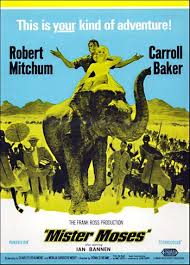
MISTER MOSES
US, 1965, 117 minutes, Colour.
Robert Mitchum, Carroll Baker, Ian Bannen, Raymund St Jacques, Alexander Knox.
Directed by Ronald Neame.
Mr Moses is popular African adventure. Robert Mitchum, that most durable of heroes over many decades, is at home in the offbeat role of the adventurer in Africa having to lead a group of natives into a promised land like his namesake Moses. He does so with a mixture of good humour and seriousness and sentiment, often riding atop of a tame elephant. Carol Baker has a metallic charm as the missionary's daughter. Some have accused the film of taking a patronizing attitude towards the Africans, especially in the presentation of Christianity. There in a strange son of a witch doctor played by Raymond St Jacques. He is a mixture of American-educated, black nationalist and the two do not seem to mix very well on the African continent. However, there is much colourful adventure of the old-fashioned style.
1. How enjoyable an adventure, comic elements, for popular audiences?
2. The visual portrayal of Africa, the terrain, the people, customs, the animals? A series of adventures in colour and wide screen?
3. The use of the biblical parallels? How much a biblical fable? How much, as Robert said, a biblical charade? The missionary situation and the religious overtones of the Bible? The attempt at explaining the dam and flood situation in the Noah story and the Chief's reaction to this? The arrival of Joe Moses, his emerging as the Prophet and leader, the people as the chosen people, his leading them through desert, difficult terrain, need for food and water, crossing
the waters which seemed to part, having a rival, breaking down the idol, and Robert's ironic twist in letting him go tree by pointing out that Moses did not actually go into the Promised Land? How effective wore the parallels and the way that they were played out in this contemporary adventure?
4. The film was peopled with conventional characters. How well were they presented and integrated into this adventure: the lackadaisical hero, with criminal tendencies, self-centred turning into a sentimental hero (and looking down on his own weakness at times?) the nice heroine the daughter of the missionary engaged to another man and being attracted by the adventurer and helping him, the missionary father who sacrifices his daughter to the hero, the fiance who is rather priggish but who gallantly relinquishes his fiancee, the Chief as the leader of the people, the witch doctor's son with his mixture of American slang and old-fashioned African superstition, his gory death? Conventional presentation of good and evil, right and wrong, heroism and weakness?
5. Robert Mitchum's style as Joe Moses? The irony of his name? As a derelict in Africa especially with the opening, his involvement in diamond smuggling? His being rescued, attended by Julie and responding to her? His antipathy towards Robert and the police? His magic and being caught by it to load the people? The humorous encounter with Emily and the bond between the two and his using the elephant against Parkhurst, for finding the water? His qualities as leader of the group, a growing wisdom? His shrewdness in dealing with the inevitable clash and fight? The seeking of the water and remaining with the people despite his possible arrest? His coming to the rescue and then the happy ending? A strong hero with happy weaknesses? A man of sentiment? How well did he fulfil the Moses figure?
6. Julie as an attractive heroine? Her life and mission work, medical skills, hopes for marriage, love of Robert, involvement in the action, devotion to Joe and choosing him at the end?
7. Mr Anderson as a missionary, his attitude towards the Africans, saying that it was their land and not forcing conversion on them, persuading them about the building of the dam, participating in their move, staying with them? A credible missionary?
8. Robert as the priggish administrator? His attitude towards Julie and her father about the dam, his dialogue with the Chief? His capture and his change of attitude towards Joe Moses? His gallant action at the end?
9. The picture of the petty bureaucrat in Parkhurst, his intimidation and allowing the water to go out of the dam?
10. The portrait of the African people, as people of the land, the prospect of a new dam, the government and administration and moving them about, their wanting to take the animals, their participation on the trek, their fickleness in following Ubi, the happy ending? Did the film patronise them?
11. The portrait of the Chief, his leadership, victimized by Ubi, his shrewd biblical applications?
12. How credible was the character of Ubi? his American education, his smart remarks, summing up Joe, helping him in the raid on the dam headquarters? and his tendency to violence and almost murder, the violence against Joe and the Chief, his using of superstition for power, his outreaching himself and destroying himself? A credible villain?
13. How satisfying an entertainment, presenting traditional values for popular audiences?
Published in Movie Reviews
Published in
Movie Reviews
Tagged under
Saturday, 18 September 2021 19:34
Miss Mary
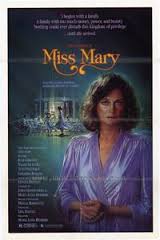
MISS MARY
Argentina, 1986, 100 minutes, Colour.
Julie Christie.
Directed by Maria Louisa Bemberg.
Miss Mary is Julie Christie as a prim English/Irish governess working for a wealthy Argentinian family, 1938-41. The portrait of the family, in a period of fascism, by writer-director, Maria Louisa Bemberg, is unflattering. They are too wealthy, too pampered and self-indulgent, eccentric with a touch of madness. Miss Mary makes a contrast in manners and morals but falls foul of their hypocritical standards. The perspective of the film is 1945 as the Peron era begins. It is also a perspective of the 1980s with Argentinian history under the generals and a more liberal government in the mid-'80s.
1. An Argentinian film and perspective? For local audiences? World audiences? A memoir of the '30s and '40s? Universal audiences?
2. Maria Louisa Bemberg and her perspective, story, writing and direction? A feminine/feminist perspective? The contribution of Julie Christie?
3. The period: the affluent families of the '30s, fascist government, families and their luxurious country estates, modelling them on European homes, wealth and style, an enclosed world? The comment on Argentinian society? The cont
rast with Europe and World War Two? The inevitability of changes? The '40s and the end of the war? The musical background, the American songs and dances? The use of the Satie piano score?
4. The title and the focus on Miss Mary, Julie Christie’s presence, English, Irish, the governess and her status, standards and morals, the Irish Catholic for the Catholic Argentinians? her wanting security in Argentinian society?
5. The 1945 setting: the regimes, fascism, their defeat, the emergence of Peron and what this would mean, change? The film as a memoir?
6. Miss Mary and her arrival: prim, her expectations, British background, Catholic background, her behaviour, a woman in this society, her education, educational standards, formality, relationships? her introduction to the home?
Her relationship with the parents, antagonism with the children? Discipline, lessons? General education and style? her insistence on standards? Her relationship with Johnny - and his devotion and infatuation? Caroline and Teresa and their antagonism, change of attitude? Alfredo and his demands? Mecha and her withdrawal? The party and Miss Mary's reaction to the relations, moral standards? Mecha and her running amok with the gun? Her concern about Johnny, care of him, his 15th birthday, his going to the brothel, his grief and coming to Miss Mary, her tenderness, the night with him? Her motives, breaking down her standards? Her dismissal?
7. 1945 and the wedding, her preparation, going? Seeing Johnny? The arranged marriage? His telling the family story? His remembering the tenderness - and Miss Mary's seemingly indifferent reaction? Her leaving this world and returning to Britain?
8. The family and its wealth, isolated, eccentric., mad? Alfredo and his work, wealth, expectations, demands on his wife, elegant living style? Enjoying the children? Mecha and her withdrawal, the dark glasses, playing the piano, her sex preoccupation and concern for her daughters, her reaction to her husband seducing Berla? The gun and her going amok? Withdrawing? The verve of the daughters, their mischief, American influences, dance, songs. games, torments?
Teresa and sex, the yacht, caught, a marriage of honour? Carolina and her vivacity, psychological decline, psychiatrists' care?
9. Johnny and his place in the family, pleasant, his infatuation, the 15th birthday, his father's standards in taking him to the brothel, the encounter with the prostitute, his reaction, going to Miss Mary, tenderness with her? On the yacht, the contrast with his sisters? The wedding - and his future?
10. The gallery of family characters and servants? Berla, the party, the seduction? Ernesto and his marrying her?
11. Argentina, nationalism, England and its contact with Argentina and its history (and the '80s)? The lack of cultural identity, the influence of the United States? People trapped in their lifestyles, codes? Repression?
Published in Movie Reviews
Published in
Movie Reviews
Tagged under
Saturday, 18 September 2021 19:34
Missing in Action
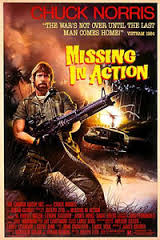
MISSING IN ACTION
US, 1984, 101 minutes, Colour.
Chuck Norris, M. Emmett Walsh.
Directed by Joseph Zito.
The Missing in Action films focus on the exploits of Colonel James Braddock. He is played by martial arts champion Chuck Norris - so the films are really Chuck Norris action adventures.
Norris built up a reputation in the late '70s as a champion turned actor. While his acting style is minimal, his screen
presence has been strong enough for a series of hit films. By the mid-80s he was something of a popular folk-hero on screen.
These films also fit into the concern by Reagan's America for prisoners of war missing in action in Vietnam. Ted Kotcheff made First Blood and Uncommon Valor, focusing on returned soldiers or exploits to free prisoners of war. First Blood had a sequel - Rambo and Rambo, in the person of Sylvester Stallone, became the personification of the militaristic hero righting the wrongs of American defeat. Battle Rage and Missing in Action are derivatives of Uncommon Valor and the First Blood, Rambo films. Produced by Cannon Films, they have small budgets, Philippine and Mexican settings, elementary staging of action sequences - but, for a popular audience, have pace and movement which keeps the audience involved.
There is some criticism of these films for their raising hopes about prisoners of war, for families distressed about the loss of family members. There was much discussion, in the context of Rambo, about the rights and wrongs of such films. Nevertheless, they were immensely popular in the United States during the mid-'80s.
1. A Vietnam action film? Chuck Norris vehicle? Focus on American society in the '80s? missing in action? The aftermath of the Vietnam war? The prisoners
2. Philippine locations for Vietnam? The contrast between America and Vietnam, the jungle sequences, the river, the prisoner of war camp?
3. The title and its focus? James Braddock and his experience in the camps? His escape? Attitudes towards the Vietnamese authorities? Concern about the prisoners of war? The bases in fact for assertions about prisoners? The attempts during the '80s to rescue prisoners of war?
4. The focus on James Braddock, his experience in the war, in prison, his escape? The aftermath of the imprisonment? His campaigning on behalf of the service men? The American investigatory committee? The encounter with the Vietnamese and the clash with General Iraan? The perjury and the discrediting of Braddock? His commando tactics to get at Iraan? The information about the MIAs? His going to Bangkok, the friendship with Tuck, Tuck and his smuggling, the rescue attempt? The assassination attempts? Colonel Vinh and his attack? The fight with Vinh? The arrival on the coast? The camp, the prisoners missing, the pursuit? The convoy? The battle, Tuck's death., the helicopter - and the retrieval of the prisoners? The prisoners confronting the American visitors and the Vietnamese authorities? Braddock's relationship with the American authorities? His vindication?
5. Tuck as friend, smuggler?
6. His gruff style? Friendship with Braddock, going up the river? Involvement in the attack? Strategies? The pursuit on the raft? His giving his life?
7. The portrayal of the American authorities, their scepticism, intrigues in government circles?
8. The Vietnamese officials, face-saving devices, brutality, their being exposed?
9. The presentation of the American prisoners of war, their plight, audience concern, the escape?
10. The film's focus on the status of America in the 80s, the experience of the Vietnam war, the defeat, the prisoners? A vindication of American might through action films?
Published in Movie Reviews
Published in
Movie Reviews
Tagged under
Saturday, 18 September 2021 19:34
Missing in Action 2: The Beginning
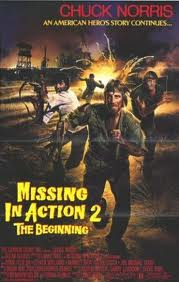
MISSING IN ACTION 2: THE BEGINNING
US, 1985, 95 minutes, Colour.
Chuck Norris.
Directed by Lance Hool.
The Missing in Action films focus on the exploits of Colonel James Braddock. He is played by martial arts champion Chuck Norris - so the films are really Chuck Norris action adventures.
Norris built up a reputation in the late '70s as a champion turned actor. While his acting style is minimal, his screen presence has been strong enough for a series of hit films. By the mid-80s he was something of a popular folk-hero on screen.
These films also fit into the concern by Reagan's America for prisoners of war missing in action in Vietnam. Ted Kotcheff made First Blood and Uncommon Valor, focusing on returned soldiers or exploits to free prisoners of war. First Blood had a sequel - Rambo and Rambo, in the person of Sylvester Stallone, became the personification of the militaristic hero righting the wrongs of American defeat. Battle Rage and Missing in Action are derivatives of Uncommon Valor and the First Blood, Rambo films. Produced by Cannon Films, they have small budgets, Philippine and Mexican settings, elementary staging of action sequences - but, for a popular audience, have pace and movement which keeps the audience involved.
There is some criticism of these films for their raising hopes about prisoners of war, for families distressed about the loss of family members. There was much discussion, in the context of Rambo, about the rights and wrongs of such films. Nevertheless, they were immensely popular in the United States during the mid-'80s.
1. Popular war action? Chuck Norris vehicle? The concern about Vietnam, the defeat, prisoners of war, American heroics?
2. The location photography, the atmosphere of Vietnam and its battles, the prisoner of war camp, the mountains, the waterfalls, the rivers, the environment of the prison? Special effects and stunts for battle sequences and the escape sequences?
3. The title and its focus? The Vietnam war still being waged? The rave against the Vietnamese oppressors?
4. The focus on James Braddock? Chuck Norris's style and presence, the imprisonment, his relationship with his fellow prisoners, with the prisoner who allied himself with the Vietnamese? With the Vietnamese Commander? The French drug-smuggler? The Australian adventurer? The humiliations, the work, the torture? The details of the prison camp? The escape attempts? Mediation? The punishment for example the rat in the hood? His eventual escape, the plan of vengeance, the destruction of the camp, the final fight with the Commander? The escape?
5. The portrait of the camp Commander, the worst aspects of the Vietnamese oppressor? Sadistic? Militaristic regime, torture, humiliation? The drug connection ? The killing of escaping prisoners, of the Australian? The French drug-runner and the clash? The final fight and his death?
6. The sketches of the prisoners of war, their experience, the imprisonment, the conditions, the torture, their interactions? The negro prisoner and his being an aide to the Commander? The provocation of fighting between the prisoners? The disdain by the Commander? His ultimately giving his life for the others?
7. The Vietnamese prisoners, their humiliation, the old man, deaths?
8. The Australian adventurer, photography, his bluff, the arrest and his death?
9. The background of drug smuggling and easy wealth in the remote areas of Vietnam? The French Connection?
10. The spectacular action sequences - plausible or not? The escape? The revenge?
11. The impact of this kind of film of American society in the '80s? The memories of the war, the defeat, the prisoners of war? American self-assertion?
Published in Movie Reviews
Published in
Movie Reviews
Tagged under
Saturday, 18 September 2021 19:34
Miss Grant Takes Richmond
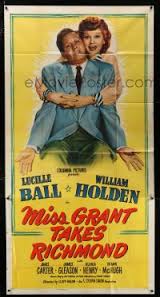
MISS GRANT TAKES RICHMOND
US, 1949, 87 minutes, Black and white.
Lucille Ball, William Holden, Janis Carter, James Gleason, Gloria Henry, Frank McHugh?, George Cleveland.
Directed by Lloyd Bacon.
Miss Grant Takes Richmond is a brief comedy which sounds like a mixture of Frank Capra's earnest social reform comedies with Damon Runyon. It is a Lucille Ball vehicle - and she enjoys herself as a failed typist, and a do-gooding receptionist and a builder of homes for the needy. She is matched by William Holden as a suave undercover bookie. There is pleasant support from James Gleason and Frank McHugh? as bookies. It is all fairly predictable - but done nicely under Lloyd Bacon's direction.
1. Pleasant comedy of the late '40s? The touch of satire? The touch of hope?
2. Black and white photography, the American city, offices? Musical score?
3. The title and its focus on Lucille Ball - and William. Holden? An engaging screen couple? (British title: Innocence is Bliss.)
4. Lucille Ball as Ellen Grant: her inept typing practice, the exam, working at home, the boyfriend? Her being chosen for the job? Assumed that she had no brains? Her earnestness about housing for those without it? her relying on her uncle, the judge? Leading people on? Getting tangled in the undercover bookie work? The clash with the wealthy gambler? Attraction towards Richmond, his kissing her to get rid of her? her determined to stay, fulfilling every request? Going ahead with the building, getting advice from the clients? The money difficulties? Her finally discovering the truth? Masquerading as a gangster? The happy ending? A Lucille Ball tour de force?
5. William Holden suave as Richmond, his friends, his bookie work, entanglement with the lady, the desperation of the $5000 bet, the people present thinking they were being helped with housing, the failure, the money, letting Ellen build the buildings, Richmond finally giving in and getting the money, the happy ending?
6. His associates - comic villains? The performance to get the money from the mean builder?
7. The lady gambler and her toughs? Lucille Ball's impersonation? Final confrontation?
8. A popular piece of Americana - law, gambling, social needs?
Published in Movie Reviews
Published in
Movie Reviews
Tagged under